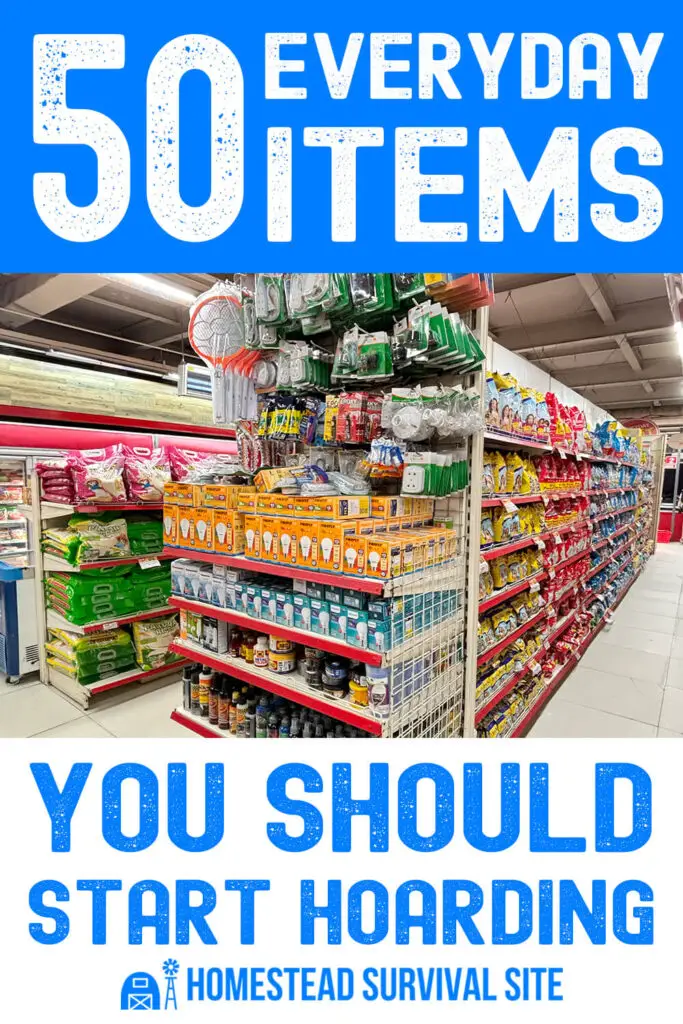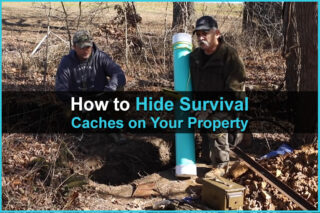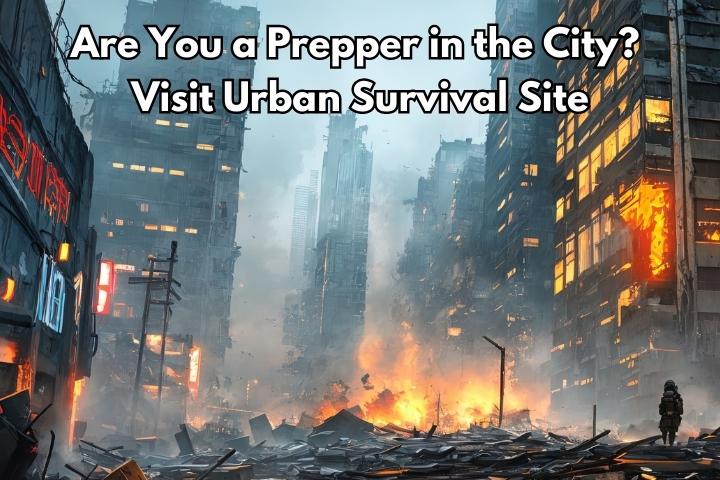Estimated reading time: 8 minutes
Unless you've been living off grid and by yourself for the past decade, you've probably noticed that the world is becoming a more dangerous place. The economy has steadily gotten worse and worse for the average person. And as a result, crime and civil unrest are on the rise.
At the same time, pandemics and natural disasters seem to be happening more and more often. And of course, the threat of nuclear war is the highest it's been since the height of the Cold War. Meanwhile, people are more dependent on the system than ever before. This is a crisis just waiting to happen.
Most people don't realize this, but our supply chain is incredibly fragile. Thanks to a system called just-in-time delivery, stores keep just enough inventory on hand to last a few days. So if a major disaster happens or a war breaks out, certain items could become unavailable very quickly.
Now, I'm not here to spread doom and gloom, but rather to help you stay ahead of the curve. If any of the disasters I mentioned happen—or even if you're just going through a period of unemployment—having a stash of everyday items could make all the difference.
Want to save this post for later? Click Here to Pin It On Pinterest!
In this article, we're going to list 50 everyday items that you should start hoarding. These are things you probably use on a regular basis, and things that could become hard to find in a crisis. Having a few months of extra supplies could help you get by until things (hopefully) return to normal.
1. Aluminum foil – Aluminum foil is incredibly useful. You can use it for cooking, preserving food, and even making makeshift tools and containers.
2. Ammunition – Ammunition is crucial for hunting and self-defense. In a crisis, it can also become a valuable barter item.
3. Baking soda – Baking soda is a multipurpose item you can use for cleaning, deodorizing, and many other things.
4. Bandages / Gauze – During a disaster, you may spend more time outdoors doing manual labor, which means injuries will become more common. Be sure you have plenty of bandages and gauze.
5. Batteries – You need batteries for flashlights, radios, and all sorts of other devices when the power is out. These are also a great barter item.
6. Blankets – If the power is out during the wintertime, blankets will be a must-have item.
7. Bleach – Bleach is vital for disinfecting water, cleaning surfaces, and sanitizing areas to prevent the spread of disease. Unfortunately, it doesn't have a very long shelf life, so consider stocking up on some pool shock instead (you can use pool shock to make bleach).
8. Body wash or soap – Personal hygiene is crucial for health, and health is crucial during pandemics or times when hospitals are overwhelmed. Don't let yourself run out of soap.
9. Candles – Candles are a reliable source of light during power outages and can also provide a little bit of warmth.
10. Cash – In a disaster, electronic payment systems might fail, so having cash on hand could be essential for buying and selling things.
11. Cleaning wipes – These are great for quick clean-ups and maintaining hygiene when water is scarce. Use disinfecting wipes for hard surfaces, but also get some everyday wipes to clean your hands and face.
12. Cooking Fuel (propane, butane) – Cooking fuel will be essential for preparing food and boiling water when the grid goes down.
13. Cooking Oil – Not only is cooking oil useful for cooking (especially frying things), but you can also use it for oil lamps in a pinch.
14. Disinfectant spray – Keeping areas clean and free of germs will be very important if a pandemic occurs. And even if there isn't a pandemic, you still want to do all you can to prevent infection and sickness during a long-term crisis.
15. Dish soap – If you don't have paper plates, you'll need to keep your dishes and utensils clean. Use it sparingly to make it last longer.
16. Dishwasher detergent – If you still have power and running water during whatever crisis occurs, then you may as well use your dishwasher.
17. Duct Tape – Duct tape is one of the most useful items ever invented. You can use it for repairs, patching leaks, and even creating makeshift items.
18. Fishing Gear – If food starts running low, being able to fish in local lakes and rivers could make a huge difference. Hopefully, other people haven't already caught all the fish.
19. First aid supplies – As I said before, hospitals could be completely overwhelmed or closed altogether during a major crisis. Make sure you have all the supplies you need for common injuries.
20. Firewood – This is an essential thing to have in the winter if you own a fireplace. Otherwise, it's nice to be able to create a good campfire for cooking food and boiling water.
21. Flashlights – Flashlights are essential if you're walking in the dark. And in the house, you can combine one with a milk jug to create a makeshift lamp.
22. Hand soap – Keeping your hands clean is crucial to prevent the spread of illness, which is even more important during times of crisis.
23. Insect Repellent and Mosquito Nets – Most people take for granted the mosquito control service provided by their local governments. During a long-term disaster, mosquitoes are going to spread out of control, along with the diseases they often carry.
24. Laundry detergent – Even if the power is out and you can't use your washer and dryer, you can still use laundry detergent to wash your clothes in a basin.
25. Lighters / fire starters – While starting a fire from scratch is a useful skill, you should still have several other methods for starting a fire. Fire is crucial for both warmth and cooking.
26. Medical Supplies (antibiotics, pain relievers) – Stock up on plenty of painkillers like acetaminophen and ibuprofen. As for antibiotics, you can buy them online. Just make sure know how to use them.
27. Paper Plates, Cups, and Utensils – If water is scarce, having paper plates and cups will be very helpful. Try to get as much use out of them as you can. And when you're done, you can add them to the compost pile.
28. Paper towels – Very useful for cleaning, wiping up spills, personal hygiene, etc. These can also be composted.
29. Personal Defense Items (pepper spray, whistles) – During a long-term power outage, crime will skyrocket. Having weapons to protect yourself could save your life.
30. Portable Solar Chargers – If you have a handful of solar device chargers, you won't have to stockpile as many batteries. Or better yet, get rechargeable batteries and a solar battery charger.
31. Portable Water Filters – Even the water from your tap could be unsafe to drink during a major crisis. Make sure you purify it before you drink it.
32. Protective Gear (gloves, masks) – In a scenario where the air is filled with dust or smoke, having protective clothing—especially an N95 mask—will keep your lungs clean and healthy.
33. Razors – While shaving during a long-term disaster isn't absolutely essential, it will help you maintain a sense of normalcy which is good for mental health.
34. Rope and Paracord – These are useful for a wide range of tasks including building shelters, securing items, and making repairs. Be sure you're familiar with all of the most important knots.
35. Sanitary products (tampons, pads, etc.) – Important for personal hygiene and comfort.
36. Seeds for Planting – If a major disaster strikes, seeds will disappear from store shelves fast. And if fresh produce is in short supply, the ability to grow your own will keep your diet healthy.
37. Shampoo and conditioner – Having clean hair helps maintain health and well-being.
38. Spices and seasonings – These can make bland survival foods far tastier. Just a small seasoning kit will make mealtime much more enjoyable.
39. Sponges – As long as you still have running water, these will be important for cleaning dishes and surfaces.
40. Stationery (paper, pencils, pens) – If modern communication methods fail, you'll want the ability to write notes or send letters to people. Plus, it could be good for your mental health to keep a journal. Besides, you'll be living through historical times. You may as well document it.
41. Sunscreen – During a long-term crisis, you'll probably spend a lot more time outdoors doing things like working in the garden, taking care animals, and building or repairing structures. Don't let yourself get a bad sunburn or you'll be miserable.
42. Tissues – If you're sick with a cold, don't get snot everywhere. Use some tissues.
43. Tobacco and Alcohol – These will make great barter items during stressful times when people are desperate for some relief. Plus, alcohol has many uses.
44. Toilet paper – No explanation necessary. If you do run out, there are some toilet paper alternatives you could try.
45. Tools (axes, shovels, saws) – These are necessary for building, repairs, and gathering resources like firewood.
46. Toothbrushes / Toothpaste – Believe me, you do not want to get an infected tooth during a time when dentists are hard to find. Take very good care of your teeth when the SHTF.
47. Trash bags – These aren't just important for waste management and storage. You can use them for many other things.
48. Vitamin Supplements – If the stores are closed or fresh produce is hard to find and you're relying on survival food, you'll want to take supplements to make sure you get all the vitamins and minerals your body needs.
49. White vinegar – Important for some recipes, but the main reason to stockpile it is for cleaning and its many other uses.
50. Ziplock bags – These are great for storing food, keeping things dry (like tinder or batteries), and for organizing your supplies.
Like this post? Don't Forget to Pin It On Pinterest!
You May Also Like:













What makes you believe that the U.S. economy will collapse anytime soon? Americans have not used gold as money for over 200 years. Few American can afford to buy gold now a days anyway.
I didn’t see gold listed at all in the article, what is “JonesCrusher” whining about? If someone isn’t smart enough to read an article and determine what might be useful information, but instead chooses to complain without adding anything beneficial, then maybe the complainer should be writing their own articles and show everyone just how “knowledgeable” they really are – or not.